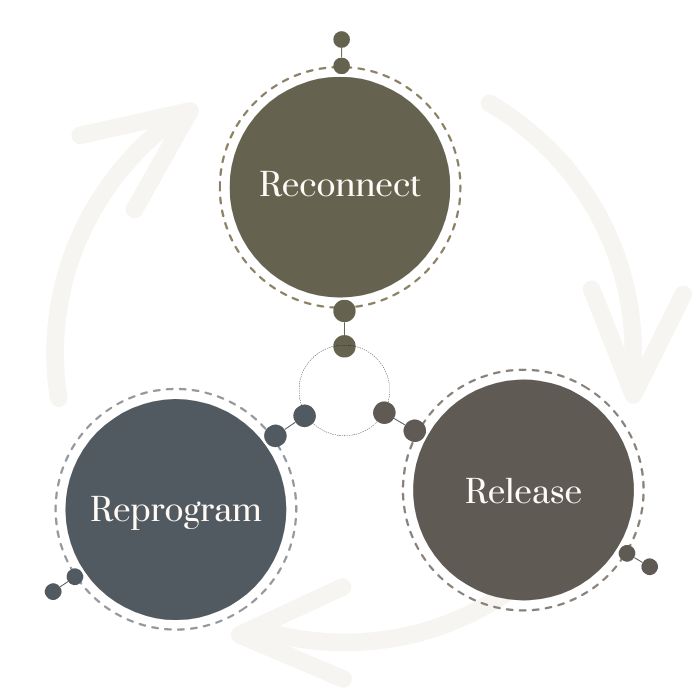Introducing the Holistic Trauma Reset™
Bridging Science and Healing for Lasting Recovery
The Holistic Trauma Reset™
A groundbreaking approach to healing from trauma based on the science of healing.
Integrating somatic healing, neuroplasticity, and cognitive reprogramming. This method, built on three key components, allows you to fully transform your life. Join us on the path to healing and rediscovering your strength. Start your journey today.

Reconnect
Reconnect to your body.
When healing from trauma, the first and most crucial step is reconnecting with your body. Trauma often causes a disconnection from your physical sensations and emotions, creating a barrier to healing.
Why Reconnecting Matters:
Trauma can trigger a defense mechanism that leads to dissociation or detachment from your body, which often shows up as anxiety, depression, or emotional numbness.
Reconnecting with your body means becoming attuned to your sensations and emotions again. This awareness forms the foundation for healing, allowing your body the space to progress toward deeper recovery steps.


Release
Release the biological imprint of trauma.
The next step in the Holistic Trauma Reset is releasing the biological impact of trauma. Somatic healing techniques help release these invisible scars, often rooted in childhood trauma. This release is a critical yet often overlooked step toward real healing and recovery.
Understanding Biological Imprints of Trauma:
Trauma leaves imprints on both your body and brain at a cellular level. It’s not the event itself, but the lingering scars that manifest as stress responses, emotional triggers, or physical symptoms. True healing requires addressing and releasing these imprints to move forward.
Reprogram
Reprogram your thoughts and beliefs.
In the Holistic Trauma Reset™ journey, the third step is reprogramming your thoughts and beliefs. Trauma can shape how you see yourself and the world, and true healing requires rewiring these patterns to foster growth.
Challenging Old Beliefs:
Trauma creates negative self-beliefs, like feeling unworthy or unsafe, and distorts your perception of the world. Reprogramming involves actively challenging and transforming these outdated, harmful beliefs to support your healing process.

Ready to Begin the Next Step in Healing Journey?
Experience lasting transformation. Whether you’re just starting out or seeking deeper healing, our resources are here to guide you every step of the way. Explore the tools and insights designed to help you reclaim your strength and find the path that’s right for you.
Why Traditional Methods Fall Short. Limitations of Conventional Approaches
While traditional trauma healing methods have provided some help for individuals experiencing symptoms from complex trauma, it’s essential to understand their limitations, which have led to the need for more holistic and innovative approaches like the Holistic Trauma Reset™.
1
Focusing Solely on Talk Therapy
Traditional methods often lean heavily on talk therapy, with Cognitive Behavioral Therapy (CBT) being widely regarded as the gold standard, emphasizing discussions about traumatic experiences.
While this can be beneficial for some, it does not effectively consider the deep biological and physiological imprints of trauma.
Traditional talk therapy can be counterproductive for trauma survivors due to impaired pre-frontal cortex function, the risk of re-traumatization, and limited access to emotional processing regions, making a holistic approach like the Holistic Trauma Reset™ more effective for comprehensive healing.
2
Ignoring the Body-Mind Connection
Traditional methods frequently overlook the strong connection between the body and mind.
Western medicine, while making significant strides in understanding and treating physical ailments, has often followed a reductionist approach. This approach separates the body and mind, focusing on diagnosing and treating physical symptoms while overlooking the intricate interplay between physiological and psychological well-being.
Trauma significantly impacts both physiological and emotional aspects, meaning this reductionist perspective can pose significant challenges for trauma survivors seeking healing.
3
Limited Use of Evidence-Based Techniques
When it comes to traditional medicine, practitioners are hesitant to embrace new healing methodologies. (e.g. EMDR, somatic experiencing, etc)
Traditional medical practices are deeply ingrained, with established guidelines and procedures. Doctors are often trained in these methods and are hesitant to adopt new approaches that challenge their existing knowledge and expertise.
Like any profession, the field of medicine can exhibit resistance to change. Physicians may hesitate to depart from conventional practices that have proven effective throughout their careers, even in the face of a substantial number of trauma survivors who still have unmet needs.
Unfortunately, this leads to medical gaslighting of trauma survivors.
4
Overlooking the Human Element
In the modern healthcare landscape, it’s not uncommon for patients to feel like you’re caught in a revolving door, moving swiftly through appointments and treatments without much consideration for your overall well-being.
This depersonalized approach often results in individuals feeling like they are not seen as whole people with unique needs, especially when it comes to addressing the complex issue of trauma.
Patients are often reduced to their diagnoses and medical history in the interest of efficiency. This can be particularly dehumanizing for trauma survivors, as it downplays the importance of their personal narratives and experiences.
Navigating Trauma Healing within Western Medicine
Lack of Trauma-Informed Care
Finding trauma-informed care can be challenging due to a combination of factors, including lack of training, stigma, systemic barriers, lack of standardization, and the complexity of trauma. This can lead to survivors of childhood trauma not getting the proper care and even receiving treatments that re-traumatize them and worsen things.
Mind-Body-Spirit Disconnect
Western medicine focuses on a reductionist approach to healthcare—doctors are trained to look at the body parts in isolation. This approach has been successful in treating acute medical conditions. However, it fails to serve trauma survivors because it doesn’t account for the mind-body-spirit connection to health and healing. Since it doesn’t address the root causes of illness, conditions continue to worsen. Leaving you with failing health and feeling more disconnected each day.
Quick Fix Approach
Western medicine often relies on a “quick fix” approach to healthcare, emphasizing pharmaceuticals and other interventions that treat symptoms rather than underlying causes. For example, if a patient presents with a headache, a reductionist approach would focus on treating the headache rather than exploring the underlying causes of the headache.
Scattered Information
Finding trauma-informed care has been incredibly difficult to find because of a lack of education, standardization, and limited availability of providers. Most healthcare providers, including doctors and therapists, are not trauma-informed because it’s not formal training. This leaves patients feeling frustrated and desperate to find the right help because you have to piece together the puzzle alone.
A healing Approach backed by science

Trauma-Informed

Mind, Body, Spirit

Comprehensive
Powerful Resources to Transform Your Healing
Embark on a journey of profound healing with two powerful resources designed to help you transform trauma and rediscover your true strength. I’ve put together two resources below to help guide you through the next steps of your journey.

Digital Resource Guide
Holistic Trauma Reset GUIDE

Online Program
Holistic Trauma Reset PROGRAM
Holistic Trauma Healing FAQ's
Holistic trauma healing is a comprehensive approach that addresses trauma on all levels: physical, emotional, mental, and spiritual.
It recognizes the interconnectedness of mind, body, and spirit and integrates various modalities such as cognitive techniques, mindfulness, bodywork, nutrition, and energy healing.
This approach empowers individuals to become active participants in their healing journey, fostering self-awareness, self-compassion, and resilience for a profound and sustainable path to recovery.
Yes, somatic healing can often be adapted to accommodate various health issues.
However, it’s crucial to consult with a healthcare professional before starting any new healing modality, especially if you have underlying health concerns.
Always prioritize your health and safety when exploring somatic healing or any other form of therapy.
The timeline for experiencing results with holistic trauma healing varies from person to person. Some individuals may notice improvements after just a few weeks, while others may require more time.
Factors such as the severity of the trauma, individual resilience, commitment to the healing process, and the effectiveness of the chosen modalities all play a role.
Generally, it’s essential to approach holistic trauma healing with patience and openness, allowing the healing journey to unfold at its own pace.
Holistic trauma healing may be suitable for you if you resonate with the idea of addressing trauma on multiple levels – physical, emotional, mental, and spiritual.
If you’re seeking a more comprehensive approach that honors the interconnectedness of mind, body, and spirit in the healing process, holistic trauma healing could be beneficial.
Additionally, if you’re open to exploring alternative modalities beyond traditional therapy and are committed to your personal growth and healing journey, holistic trauma healing may be a good fit for you.
While our current focus is on providing trauma healing support to women and mothers, our holistic approach and lessons are applicable to everyone, regardless of gender.
We know the importance of addressing trauma and promoting healing in all individuals, and men are welcome to purchase our programs and benefit from the valuable lessons we offer.
It’s important to note that our community is currently open only to women as we work to establish and grow our platform. However, we do have plans to expand our community in the future to include men and create a more inclusive space for all individuals seeking support and healing.
We had to start somewhere to get our message out to the world, and we started with women because it most closely aligned with our initial experiences and knowledge.

